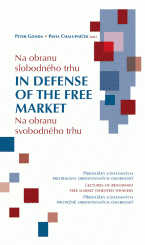 |
|||||||
| INSTITUTE | CONSERVATISM | M.R.STEFANIK |
| NEWS
|
[25.01.2006, Martina Jurinová, NEWS]
The Slovak Constitutional Court has put off indefinitely ruling on a case brought by 13 citizens who argued that the ratification of the EU Constitutional Treaty was a breach of their rights, and that the document should have been put to a national referendum. The Slovak parliament approved the EU treaty in May 2005 with the support of 116 votes in the 150-seat legislature. The citizens, who turned to the Constitutional Court last year, argued that by approving the EU treaty the parliament had also approved Slovakia's entry into another body with some of the features of a sovereign state. According to the Slovak constitution, such a decision must first be okayed in a popular vote. Representing the citizens is Ondrej Dostál from the Conservative Institute think tank. The group also includes several prominent Slovak figures such as former MPs Peter Zajac, Peter Osuský and Peter Tatár. Opposing the motion is the Slovak parliament, represented by former constitutional court justice Ján Drgonec, now an MP, who argues that the EU is not a state formation, and that parliament thus had the right to decide on the EU treaty without calling a popular vote. Drgonec said at the Constitutional Court session of January 18 that those who opposed the approval of the EU treaty in parliament had looked only at arguments against the treaty, and had failed to study the work of experts who favoured the document. The opinions of legal experts differ on the treaty, as well as on the process of its ratification. "The arguments of the complainants are based on a reading of the works of some authors, but do not consider the views of authors who say the opposite," said Drgonec in court. It is not known how long the Constitutional Court will take to issue a statement on the matter because of the complexity of the case. Constitutional Court Chief Justice Ján Mazák, who is presiding on the bench that is handling the case, noted that the justices have a demanding task ahead of them. "This is a particularly complicated case. This issue has an international, European, as well as a national dimension to it," said Mazák. Slovakia was the seventh EU member state to approve the document. However, rejection of the document by France and the Netherlands last year convinced European authorities to halt the ratification process. Dostál and the citizens he represents at court argue that by approving the treaty, parliament usurped their fundamental right to participate in the administration of public affairs. The complainants asked the Constitutional Court to find that parliament had violated the terms of article 7, paragraph 2 of the Slovak constitution in approving the EU Constitutional Treaty as an international treaty. The paragraph states: "Slovakia can transfer the execution of a part of its rights to the European Communities and the EU by an international treaty which was ratified and announced in line with the procedure set by law." However, the complainants say that in this case the parliament should have acted in line with article 7, paragraph 1 of the Constitution which says: "Slovakia can enter a state formation with other states on the basis of a free decision. Entry to the state formation with other states is enacted through a Constitutional Act which shall be confirmed by a referendum." "We argue that if the European Constitutional Treaty is ratified and takes effect, the EU would be a state formation and therefore Slovaks should have decided on the treaty in a referendum," Dostál told The Slovak Spectator. "We have submitted sufficient reasons to the Constitutional Court supporting our case and therefore hope that the court will agree with us. The session yesterday [January 18] also showed that parliament does not have enough arguments to back its case, and we have managed to overturn all of those that they have provided," said Dostál. According to Drgonec, however, parliament considered the case in detail and concluded that "the EU is an organism or a mechanism that is in movement, in development". "It is heading towards the creation of a state formation but it is questionable how many steps will still [be made], and it is questionable whether in the EU itself there is any schedule or timing for the steps that will still have to take place for the EU to become a state formation," said Drgonec during the court session. None of the parties involved dared estimate when the Constitutional Court might deliver its decision on the case. "I had the impression that the court senate took this issue very seriously but it cannot be estimated when a verdict might be delivered," said Dostál. Within one month parliament must send its arguments to the Constitutional Court in written form. Both parties can also send their comments related to the January 18 court session. Article was published on the website of the Slovak Spectator and is available here. For more please visit the website of the Initiative against the European Constitution. |
 English | Slovak
English | Slovak
This website was created also thanks to funding granted by The Trust
for Civil Society in Central and Eastern Europe.
Website powered by Metafox CMS from Platon Group.
|
Conservative Institute of M. R. Stefanik |
Tel.:
+421 258 100 188 |

 Constitutional Court to decide whether parliament violated constitution
Constitutional Court to decide whether parliament violated constitution





